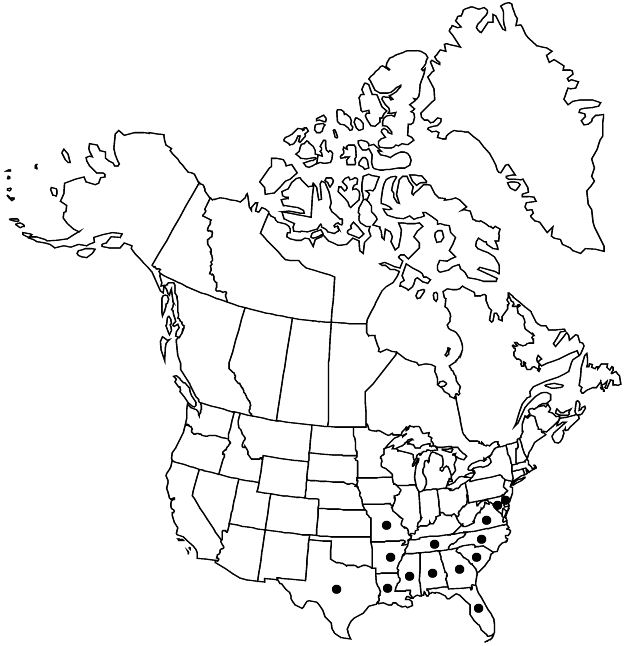Difference between revisions of "Crataegus crus-galli var. pyracanthifolia"
Hort. Kew. 2: 170. 1789.
FNA>Volume Importer |
imported>Volume Importer |
||
| (6 intermediate revisions by 2 users not shown) | |||
| Line 1: | Line 1: | ||
{{Treatment/ID | {{Treatment/ID | ||
|accepted_name=Crataegus crus-galli var. pyracanthifolia | |accepted_name=Crataegus crus-galli var. pyracanthifolia | ||
| − | |accepted_authority= | + | |accepted_authority= |
|publications={{Treatment/Publication | |publications={{Treatment/Publication | ||
|title=Hort. Kew. | |title=Hort. Kew. | ||
| Line 15: | Line 15: | ||
|name=Crataegus limnophila | |name=Crataegus limnophila | ||
|authority=Sargent | |authority=Sargent | ||
| − | }}{{Treatment/ID/Synonym | + | |rank=species |
| + | }} {{Treatment/ID/Synonym | ||
|name=C. pyracanthoides | |name=C. pyracanthoides | ||
|authority=Beadle | |authority=Beadle | ||
| + | |rank=species | ||
}} | }} | ||
|hierarchy=Rosaceae;Rosaceae subfam. Amygdaloideae;Rosaceae tribe Gillenieae;Crataegus;Crataegus sect. Coccineae;Crataegus (sect. Coccineae) ser. Crus-galli;Crataegus crus-galli;Crataegus crus-galli var. pyracanthifolia | |hierarchy=Rosaceae;Rosaceae subfam. Amygdaloideae;Rosaceae tribe Gillenieae;Crataegus;Crataegus sect. Coccineae;Crataegus (sect. Coccineae) ser. Crus-galli;Crataegus crus-galli;Crataegus crus-galli var. pyracanthifolia | ||
| Line 34: | Line 36: | ||
|distribution=Ala.;Ark.;Del.;Fla.;Ga.;La.;Md.;Miss.;Mo.;N.C.;S.C.;Tenn.;Tex.;Va. | |distribution=Ala.;Ark.;Del.;Fla.;Ga.;La.;Md.;Miss.;Mo.;N.C.;S.C.;Tenn.;Tex.;Va. | ||
|discussion=<p>Variety pyracanthifolia has a range to Missouri and Delaware and is especially common in Louisiana and parts of Florida, where it appears to be primarily a bottomland species.</p><!-- | |discussion=<p>Variety pyracanthifolia has a range to Missouri and Delaware and is especially common in Louisiana and parts of Florida, where it appears to be primarily a bottomland species.</p><!-- | ||
| − | --><p>Variety pyracanthifolia is a complex of narrowly leaved forms with glabrous inflorescences that is usually easily recognized. The typical form of var. pyracanthifolia has particularly narrow leaves with very fine teeth; it is the dominant type south of the Mason-Dixon line. North of the Mason-Dixon line is a sporadic morphotype differing by more acute-tipped, narrowly elliptic leaves with more distinct teeth. A form from northern Florida with hairy pedicels (Crataegus limnophila Sargent) is synonymized, as, contra the protologue, and has 0–3 styles. An undescribed form from the Gulf Coast, and perhaps Tamaulipas, is differentiated by more strikingly serrate leaves than any known in C. crus-galli, as well as yellow to orange fruit. Similar, but with red fruit, is C. sabineana Ashe from Louisiana and Texas.</p> | + | --><p>Variety pyracanthifolia is a complex of narrowly leaved forms with glabrous inflorescences that is usually easily recognized. The typical form of <i></i>var.<i> pyracanthifolia</i> has particularly narrow leaves with very fine teeth; it is the dominant type south of the Mason-Dixon line. North of the Mason-Dixon line is a sporadic morphotype differing by more acute-tipped, narrowly elliptic leaves with more distinct teeth. A form from northern Florida with hairy pedicels (<i>Crataegus</i> limnophila Sargent) is synonymized, as, contra the protologue, and has 0–3 styles. An undescribed form from the Gulf Coast, and perhaps Tamaulipas, is differentiated by more strikingly serrate leaves than any known in <i>C. crus-galli</i>, as well as yellow to orange fruit. Similar, but with red fruit, is C. sabineana Ashe from Louisiana and Texas.</p> |
|tables= | |tables= | ||
|references= | |references= | ||
| Line 43: | Line 45: | ||
-->{{#Taxon: | -->{{#Taxon: | ||
name=Crataegus crus-galli var. pyracanthifolia | name=Crataegus crus-galli var. pyracanthifolia | ||
| − | + | |authority= | |
| − | |authority= | ||
|rank=variety | |rank=variety | ||
|parent rank=species | |parent rank=species | ||
| Line 58: | Line 59: | ||
|publication year=1789 | |publication year=1789 | ||
|special status=Endemic | |special status=Endemic | ||
| − | |source xml=https:// | + | |source xml=https://bitbucket.org/aafc-mbb/fna-data-curation/src/2e0870ddd59836b60bcf96646a41e87ea5a5943a/coarse_grained_fna_xml/V9/V9_907.xml |
|subfamily=Rosaceae subfam. Amygdaloideae | |subfamily=Rosaceae subfam. Amygdaloideae | ||
|tribe=Rosaceae tribe Gillenieae | |tribe=Rosaceae tribe Gillenieae | ||
Latest revision as of 23:00, 5 November 2020
Leaf blades: extremely narrow (greater than 2.75:1).
Phenology: Flowering Apr; fruiting Sep–Nov.
Habitat: Brush
Elevation: 20–300 m
Distribution

Ala., Ark., Del., Fla., Ga., La., Md., Miss., Mo., N.C., S.C., Tenn., Tex., Va.
Discussion
Variety pyracanthifolia has a range to Missouri and Delaware and is especially common in Louisiana and parts of Florida, where it appears to be primarily a bottomland species.
Variety pyracanthifolia is a complex of narrowly leaved forms with glabrous inflorescences that is usually easily recognized. The typical form of var. pyracanthifolia has particularly narrow leaves with very fine teeth; it is the dominant type south of the Mason-Dixon line. North of the Mason-Dixon line is a sporadic morphotype differing by more acute-tipped, narrowly elliptic leaves with more distinct teeth. A form from northern Florida with hairy pedicels (Crataegus limnophila Sargent) is synonymized, as, contra the protologue, and has 0–3 styles. An undescribed form from the Gulf Coast, and perhaps Tamaulipas, is differentiated by more strikingly serrate leaves than any known in C. crus-galli, as well as yellow to orange fruit. Similar, but with red fruit, is C. sabineana Ashe from Louisiana and Texas.
Selected References
None.